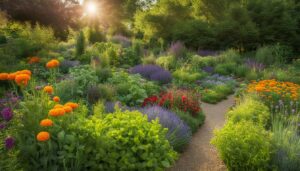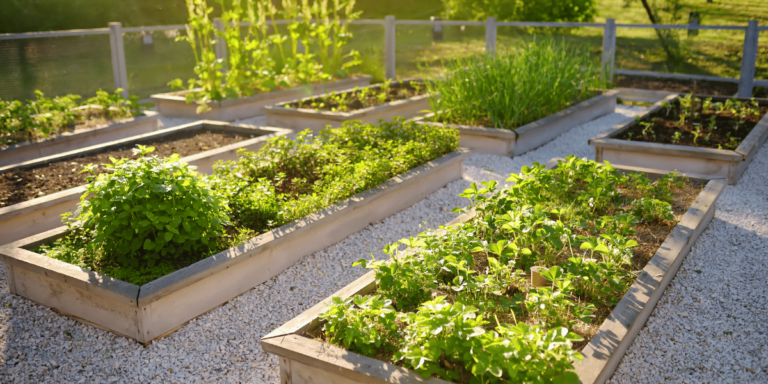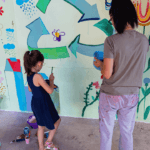Welcome to our comprehensive guide on natural pest repellents, eco-friendly solutions, and sustainable gardening practices. As gardeners, we strive to create healthier and more vibrant gardens while ensuring the safety of our plants, ourselves, and the environment. By adopting natural pest control methods, we can achieve these goals while minimizing our reliance on harmful chemical pesticides.
Did you know that homeowners use approximately three times the amount of pesticides as farmers? This overuse of pesticides not only leads to wildlife poisonings but also contaminates surface water. By embracing natural pest repellents, we can play a vital role in safeguarding our ecosystem and promoting sustainable gardening practices.
In this article, we will explore different strategies for effective pest control, including prevention techniques, attracting beneficial insects, non-toxic homemade remedies, and the concept of integrated pest management. By incorporating these methods into our gardening routines, we can create a balanced ecosystem that supports the health and well-being of our plants.
Key Takeaways:
- Prevention is the best defense against insect damage in a garden.
- Beneficial insects can be attracted or purchased to prey on harmful insects.
- Non-toxic homemade remedies can be effective in controlling pests.
- Organic pest control methods like neem oil and essential oils can help maintain a healthy garden.
- The Organic Gardener’s Handbook of Natural Pest and Disease Control provides valuable recommendations for organic pest control.
Organic Pest Control Methods for a Healthy Garden
Organic pest control is vital for maintaining a healthy garden without the use of chemical pesticides. By adopting non-toxic solutions, gardeners can effectively control garden pests while preserving the natural balance of their outdoor space. Here are some organic pest control methods to consider:
1. Hand-picking and Crop Rotation
Take a proactive approach to pest control by hand-picking pests like squash bugs and caterpillars. Regularly inspect your plants and remove any visible pests or their eggs. Additionally, practicing better crop rotation can disrupt pest lifecycles and reduce the likelihood of infestations.
2. Neem Oil
Neem oil, derived from the neem plant, is an organic pest control option known for its effectiveness. It repels garden pests without harming beneficial organisms such as pollinators and earthworms. However, it’s important to use neem oil with caution and wear proper personal protective equipment to minimize the potential for skin irritation.
3. Essential Oils
Essential oils offer a natural and aromatic way to repel garden pests. Consider using oils such as peppermint, spearmint, citronella, orange, cedarwood, and lavender to discourage ants, aphids, mosquitos, slugs, squash bugs, and whiteflies. Simply dilute the essential oil of your choice with water and apply it to affected areas of your garden.
4. Homemade Deterrents
You can create homemade pest deterrents using essential oils or other natural ingredients. Some options include:
- Homemade sprays: Mix essential oils with water and a small amount of dish soap to create a spray that can be applied directly to plants to repel pests.
- Infused cotton balls: Soak cotton balls in essential oil and place them near plants to deter pests.
- Hanging strips of infused cloth: Hang strips of cloth infused with essential oils around your garden to keep pests at bay.
- Infused strings: Dip strings into a mixture of essential oil and water, then place them strategically throughout your garden.
By implementing these organic pest control methods, you can maintain a healthy garden environment while effectively managing and preventing pest infestations.
Recommendations from The Organic Gardener’s Handbook of Natural Pest and Disease Control
The Organic Gardener’s Handbook of Natural Pest and Disease Control is a comprehensive guide to organic pest control in the garden. It provides valuable insights and recommendations for natural pest control, disease management, and promoting plant health. By following these guidelines, gardeners can maintain a thriving garden without relying on harmful chemicals.
One of the key principles emphasized in the book is the importance of promoting plant health as a preventive measure. Building healthy soil, selecting disease and insect-resistant varieties, and providing ideal growing conditions are essential for creating a garden that is less susceptible to pest and disease issues.
Identifying pests and diseases accurately is crucial for effective management. The book offers a wealth of information on how to identify common garden pests and diseases, enabling gardeners to take targeted action. This knowledge helps in choosing appropriate organic pest control methods and disease management strategies for different plants.
The Organic Gardener’s Handbook also emphasizes the need for pest prevention. Rather than waiting for pests to become a problem, adopting preventative measures such as barrier methods and promoting biodiversity is recommended. Taking proactive steps to attract and support beneficial insects in the garden helps maintain a natural balance and reduces the reliance on chemical interventions.
When intervention is necessary, organic dusts or sprays should be a last resort. By minimizing the use of these products, gardeners can prioritize the health of the environment and the overall sustainability of their gardening practices.
Accepting a certain amount of damage to plants is part of organic pest control. It is not always possible to completely eradicate pests, but by using a combination of proactive measures and targeted interventions, gardeners can achieve an effective level of pest control while maintaining the health and vitality of their plants.
| Key Recommendations from The Organic Gardener’s Handbook | Importance |
|---|---|
| Promote plant health through healthy soil and ideal growing conditions | ✓ |
| Identify pests and diseases accurately for targeted control | ✓ |
| Prevent pests through barrier methods and biodiversity | ✓ |
| Use organic dusts or sprays as a last resort | ✓ |
| Accept a certain amount of damage to plants | ✓ |
Implementing the recommendations from The Organic Gardener’s Handbook of Natural Pest and Disease Control can significantly contribute to the success of organic gardening, promote plant health, and achieve effective pest and disease management. By adopting these eco-friendly practices, gardeners can enjoy a thriving garden while minimizing the use of harmful chemicals and preserving the health of the environment.
Integrated Pest Management for a Balanced Garden

Integrated Pest Management (IPM) is a comprehensive approach to managing pests in the garden while promoting garden sustainability. Instead of relying solely on chemical pesticides, IPM focuses on a combination of prevention, monitoring, and control methods to create a balanced and biodiverse garden ecosystem.
One of the key principles of IPM is biological control, which involves the use of beneficial insects to manage pest populations. Ladybugs, lacewings, and praying mantis are just a few examples of beneficial insects that can be attracted or purchased to help control pests in the garden. These beneficial insects act as natural predators, preying on harmful insects and keeping their populations in check.
Proper identification of pests and monitoring their activity is crucial for implementing the most effective control methods. By regularly inspecting plants for signs of pest damage and understanding the life cycles of common garden pests, gardeners can take timely action and prevent pest outbreaks.
Cultural practices play a vital role in IPM. Crop rotation, intercropping, and companion planting are effective strategies to reduce pest incidence naturally. By alternating the planting of crops and intermixing different plants, gardeners can disrupt pest life cycles and create a less favorable environment for pests. For example, planting marigolds alongside vegetables like tomatoes and peppers can help repel aphids and nematodes.
In addition to using biological control and cultural practices, physical barriers can also be employed to prevent pests from reaching plants. Row covers, fences, and netting can protect vulnerable plants from pests like birds, rabbits, and deer. These barriers act as a physical barrier, preventing pests from accessing plants and causing damage.
By adopting an integrated approach to pest management, gardeners can create a sustainable and balanced garden that minimizes the use of chemical pesticides. IPM not only helps to protect the health and well-being of plants, but also promotes the conservation of beneficial insects and the overall biodiversity of the garden.
| Methods | Advantages |
|---|---|
| Biological control | – Target specific pests – Environmentally friendly – Minimal harm to beneficial insects |
| Cultural practices | – Reduce pest incidence naturally – Enhance plant health – Sustainable and cost-effective |
| Physical barriers | – Prevent pests from accessing plants – Protect plants from animal damage |
Creating a Balanced Ecosystem in Your Garden

Creating a balanced ecosystem in your garden is essential for natural pest management and maintaining the overall health of your garden. By promoting biodiversity and attracting beneficial insects, you can effectively control pests while minimizing the need for chemical interventions.
Encouraging biodiversity is a key factor in establishing a balanced garden ecosystem. Planting a variety of plants, including native species, provides a rich habitat that attracts beneficial insects such as ladybugs, lacewings, and hoverflies. These insects prey on harmful pests, helping to naturally control their populations and maintain a balanced ecosystem.
Another way to support beneficial insects is by providing them with essential resources. Flowers that produce nectar and pollen serve as valuable food sources, while sources of water and shelter offer a comfortable habitat for these beneficial creatures. By incorporating these elements into your garden, you create an inviting environment that encourages the presence of beneficial insects.
Limiting the use of pesticides and minimizing disturbance to the garden ecosystem is crucial for maintaining a healthy balance between pests and beneficial organisms. Chemical pesticides can disrupt the natural balance, harming beneficial insects and other organisms that contribute to the garden’s ecological health. Instead, focus on natural pest management methods and organic solutions to address pest issues without causing harm to the ecosystem.
Incorporating organic composting, green roof ecosystems, and contemporary garden artistry can further enhance the ecological sustainability of your garden. Organic composting enriches the soil, promoting the growth of healthy plants that are more resilient to pests. Green roof ecosystems provide additional habitat for beneficial insects, while contemporary garden artistry contributes to the overall aesthetics and biodiversity of the garden.
In conclusion, creating a balanced ecosystem in your garden is crucial for natural pest management, attracting beneficial insects, and preserving biodiversity. By implementing these practices, you can maintain a healthy and thriving garden while minimizing the use of harmful pesticides.
Conclusion
Natural pest repellents and eco-friendly gardening practices are crucial for maintaining healthier and more vibrant gardens. By embracing sustainable practices such as integrated pest management, organic pest control methods, and creating a balanced ecosystem, gardeners can reduce their reliance on chemical pesticides and contribute to a more sustainable environment.
Safe and sustainable gardening starts with the use of natural pest repellents, which are not only effective in controlling pests but also promote the overall health and biodiversity of our gardens. By implementing these eco-friendly solutions, gardeners can protect beneficial insects and ensure the long-term sustainability of their gardening endeavors.
By prioritizing sustainable practices like eco-friendly pest control and a balanced garden ecosystem, gardeners can create harmonious and thriving garden spaces where the use of harmful chemicals is minimized. This commitment to eco-friendly gardening not only benefits the environment but also creates a healthier and more enjoyable gardening experience for all.
FAQ
What are some eco-friendly solutions for natural pest repellents?
There are several eco-friendly solutions for natural pest repellents, including prevention methods such as building healthy organic soil, minimizing disturbance, and interplanting and rotating crops. Using seaweed mulch or spray, minimizing insect habitat, and attracting beneficial insects like ladybugs and lacewings can also help control pests.
How can I control pests in my garden without using chemical pesticides?
There are several non-toxic methods for controlling pests in the garden. Hand-picking pests, practicing better crop rotation, and using organic sprays and dusts are effective options. Beneficial insects, like brachonids and ichneumon wasps, can also be attracted or purchased to prey on harmful insects.
What are some organic pest control methods I can use in my garden?
Organic pest control methods include using homemade remedies like canola oil and soap spray for soft-bodied insects, neem oil for repelling pests without harming beneficial organisms, and essential oils like peppermint and lavender to deter specific pests. The Organic Gardener’s Handbook of Natural Pest and Disease Control provides comprehensive guidance on organic pest control.
How can I create a balanced ecosystem in my garden for natural pest management?
Creating a balanced ecosystem involves attracting beneficial insects by growing a variety of plants, providing resources like flowers and water sources, and limiting pesticide use. Biodiversity and minimizing disturbance to the garden ecosystem are also important for natural pest management.
What is integrated pest management, and how can it help maintain a balanced garden?
Integrated pest management (IPM) is an approach that combines prevention, monitoring, and control methods for pest management. It emphasizes the use of biological control, cultural practices like crop rotation and intercropping, and physical barriers. Proper pest identification and monitoring are crucial for implementing effective control methods.
Why is it important to use natural pest repellents and practice sustainable gardening?
Using natural pest repellents and practicing sustainable gardening helps maintain healthier, more vibrant gardens while reducing the use of chemical pesticides. It contributes to a more sustainable environment and preserves the health and biodiversity of our gardens.










